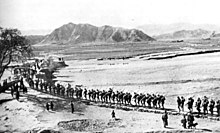You can help expand this article with text translated from the corresponding article in Chinese. Click for important translation instructions.
|
| Xinhai Lhasa turmoil | |||||||
|---|---|---|---|---|---|---|---|
 After the fall of the Qing dynasty, Sichuan New Army left Lhasa in 1912. | |||||||
| |||||||
| Belligerents | |||||||
|
|
| ||||||
| Commanders and leaders | |||||||
|
13th Dalai Lama Tsarong Dazang Dramdul 3rd Tsomonling Rinpoche [nl] Xie Guoliang |
Lianyu [zh] Zhong Ying [zh] | ||||||
| Casualties and losses | |||||||
| Unknown | Unknown | ||||||
The Xinhai Lhasa turmoil (Tibetan: ཆུ་བྱི་དམག་འཁྲུག་, Wylie: chu byi dmag 'khrug; Chinese: 辛亥拉薩動亂) was a series of mutinies among Qing military troops stationed in Lhasa, Tibet, followed by the military conflict between Tibetan militar and Qing garrison. It effectively resulted in the end of Qing rule in Tibet.
Background
The Wuchang Uprising unfolded on October 10, 1911, and marked the beginning of the Xinhai Revolution. Turmoil in the frontier regions of China began to spread. The revolutionaries led by Sun Yat-sen insisted on "getting rid of the Tartars" and rejected the Manchus, creating a new government based completely on Han-dominated China proper.
Turmoil in Tibet
The influence of the Wuchang Uprising rapidly spread to the frontier region. Qing armies in Tibet ended up struggling against each other, and as a result, Tibet fell into a state of anarchy. In the winter of 1911, the Qing Governor of Sichuan, Zhao Erfeng, was executed by radicals, and the situation turned worse as Xikang fell into turmoil as well. The last Qing emperor, Puyi, also abdicated in February 1912. As a result, the Dalai Lama was able to eliminate Qing influence in Tibet and return as the sole administrator of the region. Tibetan militia besieged the station of Qing army, which was unable to resist Dalai Lama's forces. In August 1912, the Qing officials in Lhasa were then forced to sign the "Three Point Agreement" for the surrender and expulsion of Qing forces in Tibet. Finally, all officers and soldiers of Qing fled back to inland China via India.
See also
- Tibet under Qing rule
- Lhasa riot of 1750
- Chinese expedition to Tibet (1910)
- 1911 Revolution
- Tibet (1912–1951)
- Tibetan independence movement
- Dalai Lama
References
- ^ Melvyn C. Goldstein (18 June 1991). A History of Modern Tibet, 1913-1951: The Demise of the Lamaist State. University of California Press. ISBN 978-0-520-91176-5.
- Tanner, Harold (2009). China: A History. Hackett. p. 419. ISBN 978-0872209152.
- 张召庸; 喜饶尼玛 (2011年). "清末民初拉萨动乱性质初析". 中国藏学 (1): 34–43. Archived from the original on 2018-08-21.
| Tibet articles | |||||||||
|---|---|---|---|---|---|---|---|---|---|
| History |
| ||||||||
| Geography |
| ||||||||
| Politics |
| ||||||||
| Economy | |||||||||
| Society |
| ||||||||